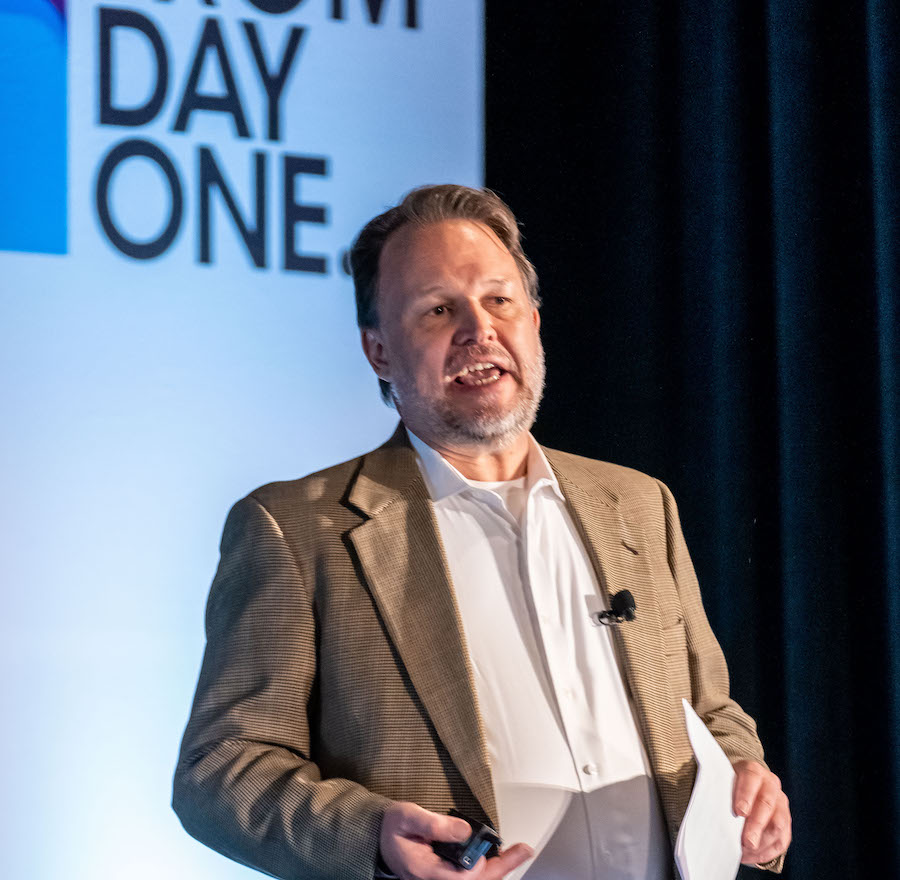Tech-Driven, Human-Centered: Building the Future of Work


While some employees fear layoffs due to AI, including HR professionals and recruiters, Jerry Aubin, the CEO of BountyJobs asserts that “leveraging technology is the best path to maximize the humanity of our organizations.” Humanity, connection, and empathy are not just what the incoming generation of workers want, it’s what they expect. Aubin led a thought leadership spotlight on the subject, titled, “Tech-Driven, Human-Centered: Building the Future of Work” during From Day One's Austin conference.
While well-being and humanity were addressed during Covid, many companies resorted back to outdated norms resulting in a mass exodus of 50 million people from the workforce in 2022. A LinkedIn study revealed that 87% of Gen Z professionals are prepared to go elsewhere if another organization aligns with their values. A staggering 80% of employees are not fully engaged in their work and two-thirds are not feeling good about their well-being according to a recent Gallup poll. Aubin asks, “How can we possibly expect these people to bring their A-game to work?”
What Does Humanity In the Workplace Look Like?
Humanity isn’t built into a benefits package or stated in a company policy. Younger workers have cited open, transparent, ethical leadership as well as diverse, inclusive, and equitable workplaces in addition to empathy as top priorities. Managers need to know and genuinely care about what’s happening in employees' lives without being intrusive.
Aubin said it’s also about “doing everything possible to help [employees] succeed not only in the office, but when they're outside of them.” Empathy also comes in the form of flexibility. Aubin shared the story of an employee who had skills that were impossible to replace. He also needed to care for an aging parent out of state. This employee had already been working in a full-time remote position for the last three years. Despite all the time and effort he put into identifying solutions to ensure the organization wouldn't be impacted, leadership refused to budge on the requirement to stay in Austin. As a result, he walked–and decades of critical knowledge walked out with him.
Intentionally Blending Humanity and Technology
Technology simultaneously has the power to massively disrupt the way we do business, yet Aubin is sure that “these same tools are going to help us get to the core of what we need–and that is the human aspect of our most critical work.”

Ethan Moloch, a professor at the Wharton School of Business, is promoting a helpful framework for using AI to accomplish some of the tedious work we don’t want to do anyway. “Several billion people just got free interns,” Aubin said. “The [technology] is smart...but at the same time, it must be trained. We have to figure out the best way to divide up the work between us and them.” Recent studies show that people achieved huge bumps in productivity by using AI tools while reporting significantly higher job satisfaction.
Aubin decided to put one of these tools, ChatGPT, to the test after reading an article in HR Executive predicting that AI will make HR extinct. ChatGPT excels at language focused tasks just like the work that currently consumes the vast majority of time for knowledge workers like HR staff. Aubin began by asking the tool to compare a candidate's resume to a job description to see if they were a good fit. ChatGPT noted how the candidate had an extensive background including telemedicine even though it wasn't mentioned in the job description since telemedicine is a huge factor influencing health care right now. While the resume made no mention of the candidate’s willingness to travel, ChatGPT made the correct inference based on its understanding of the role that the candidate was a good fit for.
In another experiment, Aubin posed as an agency recruiter. He gave the same resume and job description to the system, but instead asked it how to improve the resume for a more compelling match to the job description. Concrete specific suggestions came back that “even my 18-year-old would manage to follow. If I were working at an agency and saw results like this from a brand-new intern fresh off the streets with zero training, I would be absolutely thrilled.”
Aubin is not advocating for AI tools to do all the work, rather, the tools can help us do our best work. Envision one of your internal recruiters. What will their day be like after they have trained an army of interns to handle some of the tasks that enable your organization to function? “My hope is that [the recruiter] will be able to focus her time on the part of her job that she actually loves–and that's being an ambassador for your company and creating and nurturing those relationships with candidates. No AI is ever going to replace the genuine human connections that make people feel seen, valued, and ultimately, in our interests, beg to be hired. How impactful might an outcome like that be for your organization?” asked Aubin. Ultimately, blending transformative technologies with the irreplaceable power of human connection is our best chance of providing the satisfaction and fulfillment employees not only demand but deserve.
Editor’s note: From Day One thanks our partner, BountyJobs, for sponsoring this thought leadership spotlight.
Gail Gonzales is a writer, brand strategist, and designer based in Austin, Texas. Her boutique agency, Evolve Your Brand, helps business owners who care about the positive evolution of people or the planet amplify their message.
The From Day One Newsletter is a monthly roundup of articles, features, and editorials on innovative ways for companies to forge stronger relationships with their employees, customers, and communities.